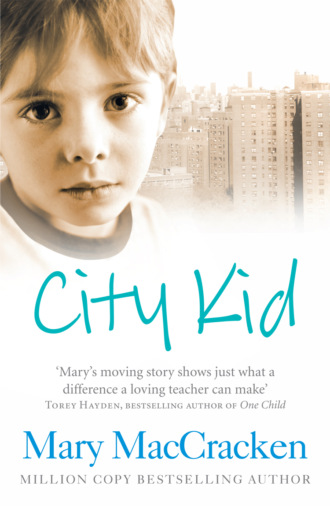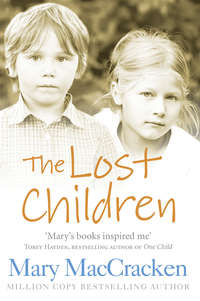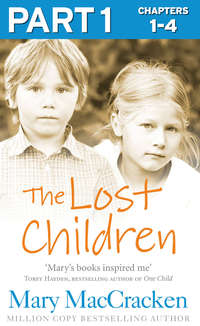
Полная версия
City Kid
“Professor Foster?” I asked from the hall. “I’m Mary MacCracken. Could I see you for a minute about signing my course schedule?”
“Mary MacCracken? Where the hell do you keep yourself? I’ve been trying to locate you for weeks. Ever since I discovered you’d been a teacher at Doris Fleming’s school and have over six years’ experience with emotionally disturbed kids. Is that right?”
I nodded.
“Well, come in. Sit down.” He lifted a pile of journals from a chair beside the desk. “Do you ever hear from Doris? I’ve been out to that school several times. Damn good reputation, even before it got state approval. Those are tough kids. When did you teach there?”
“Until last year.”
“What the hell are you doing here?”
“Trying to get certified.”
“Ah, I get it. Last year is when the state approval came in, right? No tickee, no job, eh?”
I nodded.
“Well, Doris is a tough old war-horse, but she kept that school alive when no one else could.”
“Yes, she taught me a great deal.” Glad that I could say it. That the hurt of having to leave was easing.
“Okay now,” Foster said, “let’s get down to business. We have come up with a terrific idea.”
“We?”
“Yeah. Bernie Serino and me and the Falls City Mental Health Clinic. You know Bernie?”
“Yes. He was supervisor of special ed when I was teaching and helped me get one of my kids back into a regular class in junior high.”
“Yeah. Well, Bernie and I have lunch every Wednesday. A little business, a little pleasure. We’ve known each other a long time.
“In some of the districts they’re having a hell of a time with the younger kids. Not just truancy, you expect that, but stealing, setting fires, drugs – you name it. So what happens, they call the school social worker or psychologist, she adds a name to her list. Then the truant officer, they call him something fancier, but I don’t remember what it is, checks in. Nine times out of ten he comes back and says it’s a ‘broken home,’ either the father’s skipped or nobody knew who he was. All they got is uncles, Uncle This and Uncle That. Every time Mom gets a new boyfriend, the kids get a new uncle. Convenient, but unstable.
“So they have a conference and call up Bernie and tell him they need ‘special services.’ Well, about the only ‘special services’ Bernie’s got any connection to where he might get help for these kids is the Mental Health Clinic. They’re a good bunch, working hard in the community, but they got an even longer waiting list than the school social worker.”
He paused and I asked what he knew I would ask.
“What happens?”
“What happens?” Professor Foster banged his feet to the floor and leaned toward me.
“Same damn thing happens every time. By June the kid has moved up to number thirty on the waiting list. He’s been picked up by the police, taken to court, warned and fined, and released. The school year ends and the whole thing begins all over again the next fall.”
I said nothing. I sat looking at my hands, feeling the old familiar sadness as I heard about the children. What sense did it make? Any satisfaction I had felt at completing registration faded. What was I doing here in this college memorizing the commutative, associative, distributive mathematical properties and the content and study skills of reading?
I was so deep in my own thoughts that I missed the first few words or sentences of Professor Foster’s next statement, tuning in when he got to “… the Mental Health Clinic has gotten a grant to put ‘therapeutic tutors’ into one of the schools in Falls City on a trial basis. Bernie’s agreed and picked the school and I’ve offered to supply the therapeutic tutors.”
“What’s a therapeutic tutor?” I interrupted.
“Somebody who’s good with kids. What else? You can hear it in fancy words later. So what do you say?”
“It sounds like a good idea from what you’ve told me.”
“No. Not that. Will you do it? Be a tutor?”
“Me?” I couldn’t believe it. I answered instantly before he could change his mind. “I’d love to. Where do I go?”
Professor Foster smiled at me. “Don’t you want to know about credits – hours?”
I looked down, embarrassed and immediately shy. I had been too eager, revealed too much. I nodded.
“Well, first there’ll be training sessions at the clinic. Then you’ll see your child three times a week for about fifty minutes each session. Eventually you’ll have three children.”
In my mind’s eye, I could see the schedule of courses that I had just completed. Falls City was about twenty minutes from the campus; that would mean another forty minutes each time I went down. There wasn’t a day when there was a block of time long enough. Wordlessly I handed Professor Foster my schedule.
He studied it briefly, then whacked it down on the table.
“What the hell is this? How could you sign up for classes before you checked with me? Am I your adviser or not? Why didn’t you ask for advice?
“Never mind,” Foster said after a minute, picking up my schedule. “Sorry. Didn’t mean to yell. Let’s see what we can do.” He studied it closely and then grinned at me. “At least you’ve got good taste, picking ‘Counseling and Guidance for the Handicapped’ – that’s mine. Unfortunately, it’s only a two-credit course, but at least that gives us a couple of hours to play with. Mmm-de-dum-dum.”
Professor Foster hummed to himself as he flipped through catalog pages, checking them against course requirements and my own schedule. Finally, he looked up at me and said, “That’ll do it. Drop History of Ed and take Independent Study in its place and spend the time of my course at School Twenty-three and you’ll be all set.”
“What’s Independent Study? And what do I do about History?”
“Independent Study is whenever I want you to do something. I just write up a slip and send it to the dean. You’ll get your three credits.”
“Power,” I said.
“What was that?”
“Nothing.”
“Okay, now. Go on back to registration before it closes and drop that history course. You can always take it next year, there are plenty of sections. Here’s a note if you need it.”
“Thank you,” I said as I stood up. “When, where will I start?”
“Well, the other two tutors are both seniors with much more freedom in courses, so scheduling will be a lot easier for them. Let’s see your schedule again. Okay. You’ve got some time on Monday afternoons. We’ll meet down at the clinic at two.” He glanced out his door. Four pairs of blue-jeaned legs could be seen below the hall bench.
“Ah. Gotta rush now, way behind. See you next Monday. Call the clinic to get directions down there. Sorry I can’t talk longer.” He was already standing, tucking in his shirt, smoothing back his hair.
The line was still long at the student union. I went up to the guard at the door. “I’ve already registered. I just want to drop one course. Is it all right if I go in?”
“Name, please.”
“Mary MacCracken.”
“MacCracken. M. That’s all right. Social security number?”
“No. Look, I’ve already done this. I don’t need to regis –” it wasn’t any use. I was just wasting time. I sighed. “One four seven –”
“All right. Step to the back of the line. No exceptions.”
I went back. Six new people in line since I arrived, but I should have known better than to ask the guard. There were no exceptions on the lines, only in professors’ offices.
But if the system bothered me, it couldn’t snuff out the small bubbles of excitement surfacing inside me. What kind of children would they be? What were we going to do together? Who would be my child?
Chapter 3
It was cold, even for the end of January, and the fact that there was no snow made it worse. The campus looked bleak and bare, and the contrast with the remembered warmth of Christmas made it even more difficult for me to return.
We had spent most of vacation and winter break at our house in the country. We cut our own tall, wonderful, scraggly Christmas tree and carried it up from the woods. We hung eleven stockings in front of the stone fireplace, ours and the children’s and the grandparents’ and friends’.
The house was not meant to be a winter house. Cal’s parents had built it for summers fifty years before. It took days to warm the stone walls and floors. The small furnace worked valiantly, shedding soot as well as heat. Gusts of wind and small mice scurried through chinks in the stone walls to the inside warmth of the house.
In the mornings we lay in bed and blew smoke rings of warm breath into the frosty air and then rushed from bed to shiver by the window as we watched deer leap across the meadow. We ate simple meals and trudged along un-plowed roads, chopped logs and read and talked quietly to each other. Happiness was almost visible that week.
Vacation over, spring courses began. I wondered if every one had as hard a time coming back to school as I did. But I did have seventy-six credits now – five A’s and a B – and fifteen more credits coming up this semester. If I could just get through Statistics and Orientation to Psychological Testing and Background of Mathematics II, I’d have ninety-one by May. And now, thanks to Professor Foster, there would be children.
Many of the faces in Background of Mathematics II were familiar, but instead of Dr. Kaiser, the teacher was a man in his thirties, wearing black horn-rimmed glasses – and there, sleeping beneath a grubby tennis hat, was Ian Michaels. My spirits lifted.
I stepped over several pairs of blue-jeaned legs and settled beside Ian, who continued to sleep, or to pretend he did.
On the board was written Background of Math II. Beneath this was the statement:
A denumerably infinite set is one that can be put in a 1–1 correspondence with the set of counting numbers.
Oh, no. Here we go again. I had thought we’d at least be to something like fractions.
I opened my notebook and copied the statement down anyway; I could puzzle over it later.
A familiar hand reached lazily across the page and scrawled an example.
Ex: The set of multiples of 5 is a denumerably infinite set.
1, 2, 3, 4, 5, … n …
5, 10, 15, 20, 25, … 5n …
I looked at what Ian had written. Okay, I see that. I smiled at Ian’s tennis hat.
“Thank you,” I said, settling back in my chair. “The one thing I’m good at in math is knowing how to pick the right seat.”
If classes at college were as frustrating as ever, our training sessions at the clinic were fascinating.
The Mental Health Clinic was in the center of Falls City on the second floor of the Logan Building, and although the streets were littered and the surrounding buildings shabby, there was a lingering ambiance of power and elegance.
In earlier years Falls City had been a leading manufacturing center. Its chief industries were the dyeing and finishing of textiles and the manufacture of silk. But with the rising popularity of synthetic fabrics, business declined and companies closed. Although pockets of culture remained, the downtown area had become drab and rundown and the population was predominantly lower middle class.
Inside the Logan Building, shabbiness was more evident. Water stains marked the ceilings, walls needed painting, floors were bare, furniture was folding metal. But there was a lot of space, a large waiting room, several secretarial offices, and a half-dozen rooms for therapists to meet with clients. Some rooms were furnished with chairs, table, and couch; another had low furniture and toys for children. We met in the children’s room.
The other two tutors were both seniors, Shirley Hayes and John Hudson. Shirley was quiet, with a soft sure voice and dark smooth skin. Hud was tall, slender, red-haired, filled with vitality. Shirley was going on to graduate school next year, and was working now as a clerk in a department store after her college classes to earn tuition. Hud was job-hunting, hoping to teach teenagers with emotional problems. I liked them both. Hud had worked with multiply handicapped children at summer camp. Shirley with disadvantaged children at a day care center.
Jerry Cotter had been put in charge of the program and conducted our training sessions. He was small, with a brown-gray beard and a gentle handshake. His official title at the clinic was psychiatric social worker.
At our first meeting Jerry said, “This program could be the beginning of a revolutionary change in the treatment of emotional problems in children. The central idea is to expand and intensify mental health services in the schools themselves, instead of letting kids vegetate on waiting lists. We are going to try to do this through therapeutic counseling and tutoring at the school – and you are the ones who are going to do it.”
At later sessions Jerry stressed again that help would go to the child in a familiar place, his school, rather than the child going, or waiting to go, to a clinic. He also said we would not be asked to work with psychotic children, the ones who were so disturbed that they would be considered autistic or schizophrenic. He smiled at me. “These children are not as out of touch with reality as the children you’ve worked with, Mary. Instead, they take their anger out on society, stealing, burning, destroying, and earn the label of ‘socially maladjusted’ or ‘juvenile delinquent.’”
I smiled back but didn’t reply. Labels meant little to me. In fact, as far as I could see, their only use was to give a name to a program so it could be funded. Nobody funded anything without a name.
The next four sessions focused on diagnostic tests and teaching procedures. Jerry demonstrated the administration and scoring of various tests given to screen for emotional or neurologically based impairments. We, of course, did not have the skill to score the tests ourselves, but we were all amazed at how much information he was able to obtain from such seemingly simple devices.
Our last session was on observing and charting behavior. Jerry gave us stopwatches and taught us how to use observation charts, marking down the number of incidents of a child’s disruptive behavior during short intervals carefully timed by the stopwatch.
At the end of this session, Jerry said, “That’s it. I, of course, will be at the school scoring tests and supervising from time to time. The grant covers the rest of this year and I’ll get over as much as I can, but we’re short-handed here and you’re going to be more on your own than originally planned.
“Anyway, good luck. I’ve enjoyed our sessions together and I’ll see you all at School Twenty-three on Wednesday.”
How could I wait till Wednesday?
Конец ознакомительного фрагмента.
Текст предоставлен ООО «ЛитРес».
Прочитайте эту книгу целиком, купив полную легальную версию на ЛитРес.
Безопасно оплатить книгу можно банковской картой Visa, MasterCard, Maestro, со счета мобильного телефона, с платежного терминала, в салоне МТС или Связной, через PayPal, WebMoney, Яндекс.Деньги, QIWI Кошелек, бонусными картами или другим удобным Вам способом.






